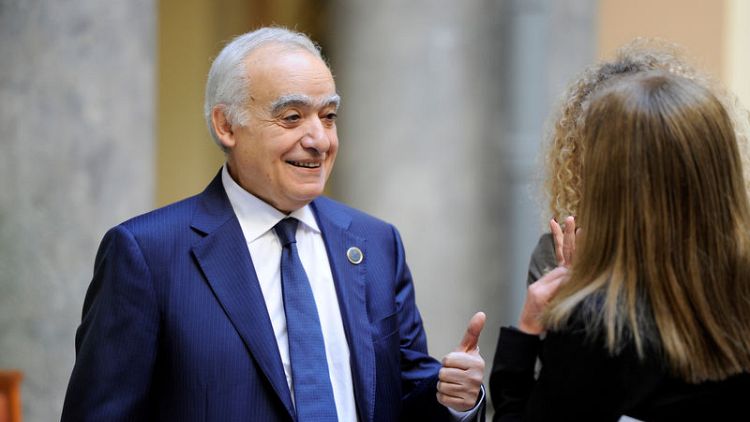By Ulf Laessing
PALERMO, Italy (Reuters) - Italy will host a Libya conference that starts on Monday and aims to push forward a new U.N. plan to stabilise the troubled North African country after a initiative to hold elections next month failed.
Last week, U.N. Envoy Ghassan Salame officially abandoned a Western plan to hold national elections on Dec. 10 as way out of conflict that has raged in the oil producer since the toppling of Muammar Gaddafi in 2011.
Instead the United Nations, which has been trying to mediate for years, wants to hold first a national conference to reconcile a country divided between hundreds of rival armed groups, tribes, towns and regions.
Western powers that helped topple Gaddafi then left Libya to its chaos, letting militias and radical Islamist groups grow.
But worried about it turning into a source of instability on the shores of Europe, European powers have recently paid Libya more attention, and diplomats hope the two-day meeting in the Sicilian city of Palermo will keep up that interest.
France hosted a summit in May during which the main Libyan rivals pledged to hold parliamentary and presidential elections in December.
But weeks of fighting between militias in the capital Tripoli, as well as deadlock between rump parliaments in Tripoli and the east, has made that plan unrealistic.
Italy hopes the conference will help keep pressure on Libyan players to overcome their divisions.
The OPEC oil producer has two governments, a U.N.-backed administration in the capital and a largely powerless eastern version aligned with influential veteran commander Khalifa Haftar, whose forces control much of the east.
RIVALS
Italian officials were scrambling at the weekend to secure Haftar's presence. If he shows up, it will be his first meeting with the Tripoli-based Prime Minister Fayez al-Serraj since the Paris summit, analysts said.
"I expect him (Haftar) to be present since there is no doubt that he is one of the decisive players of the stabilisation of his country," Italian Prime Minister Giuseppe Conte said in an interview with La Stampa newspaper.
Also in attendance will be the internationally recognized House of Representatives, as well as the State Council, a rival assembly.
Western diplomats hope the meeting will help overcome differences between Italy and France, which both have extensive oil interests in Libya but have used different approaches to trying to resolve the conflict.
France has been courting Haftar, who is supported by Egypt and the United Arab Emirates, which see his forces as a bulwark against Islamists.
Italy is the main backer of Serraj and his weak Government of National Accord (GNA), and has worked with local groups in Libya to stop Europe-bound migrants from embarking by boat.
In his newspaper interview, Conte denied that there was rivalry with France over Libya, saying Paris and Rome share "the same viewpoint and objectives".
"We face a common challenge (the stabilisation of Libya) and the risks of a further deteriorations of the crisis are weighing on us all," Conte said.
Western power want Serraj's government to enact economic reforms to a system that they say gives Libya's multitude of armed groups easy access to cheap dollars.
The U.N.'s Salame told la Repubblica newspaper that the question of economic reform and security would be central to the Palermo meeting. "We need to work to make sure Libya's resources benefit the entire population and not just a few millionaires who are becoming ever richer," he was quoted as saying.
Diplomats say delayed reforms introduced in September, including a fee on purchases of foreign currency, can only partially ease Libya's economic woes as long as the central bank remains divided and predatory factions retain their positions.
(Reporting by Ulf Laessing; Editing by Daniel Wallis and Crispian Balmer)
